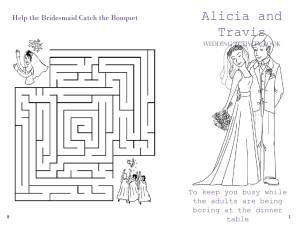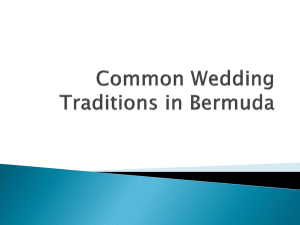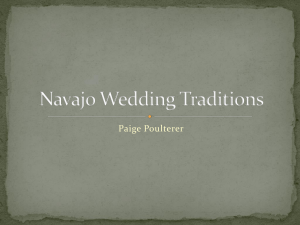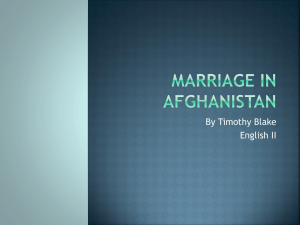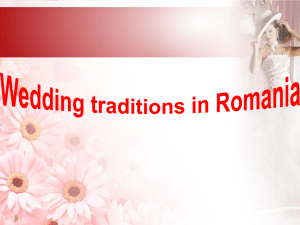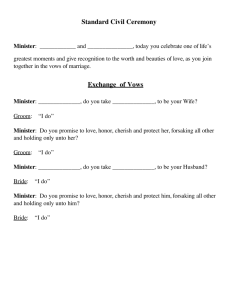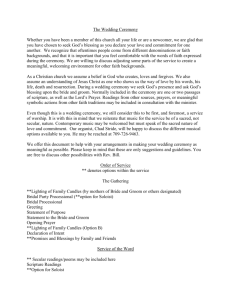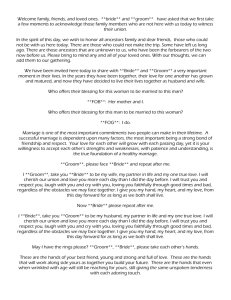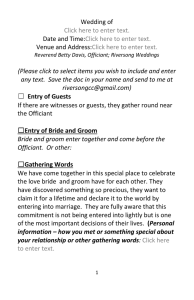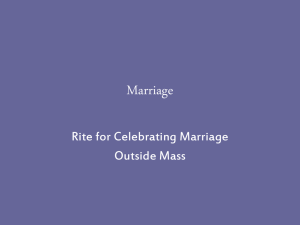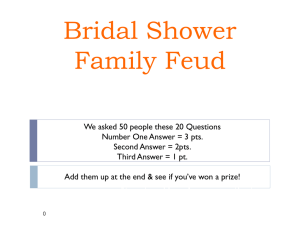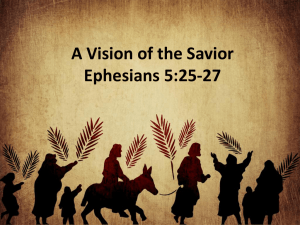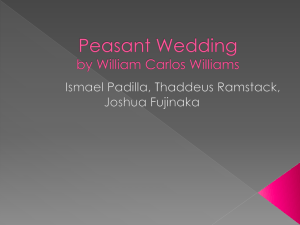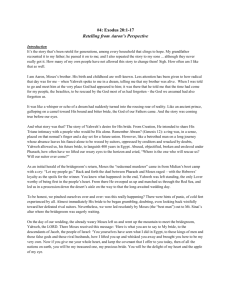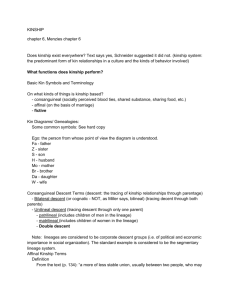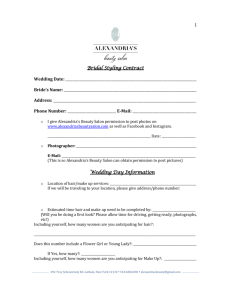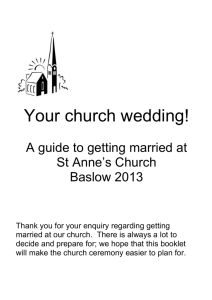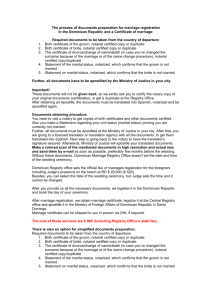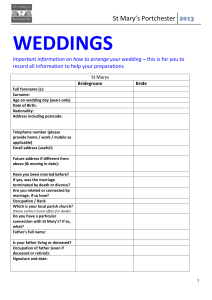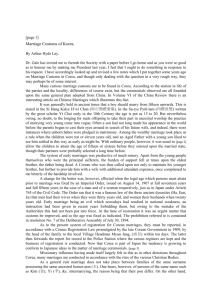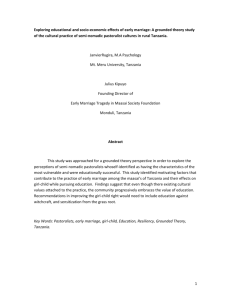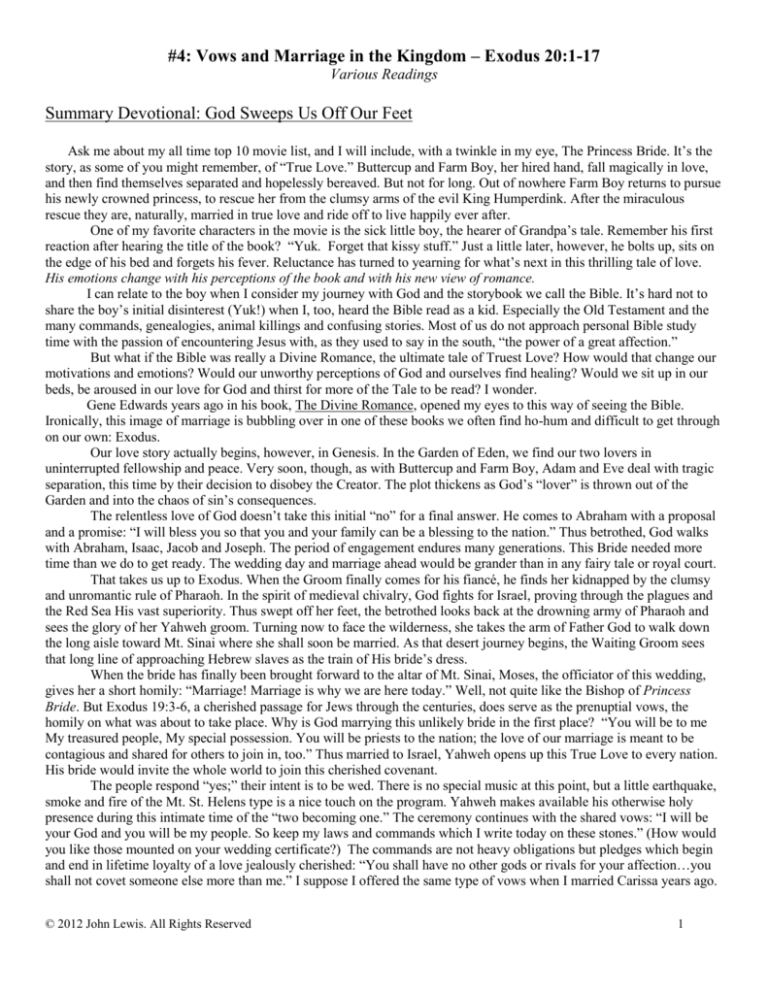
#4: Vows and Marriage in the Kingdom – Exodus 20:1-17
Various Readings
Summary Devotional: God Sweeps Us Off Our Feet
Ask me about my all time top 10 movie list, and I will include, with a twinkle in my eye, The Princess Bride. It’s the
story, as some of you might remember, of “True Love.” Buttercup and Farm Boy, her hired hand, fall magically in love,
and then find themselves separated and hopelessly bereaved. But not for long. Out of nowhere Farm Boy returns to pursue
his newly crowned princess, to rescue her from the clumsy arms of the evil King Humperdink. After the miraculous
rescue they are, naturally, married in true love and ride off to live happily ever after.
One of my favorite characters in the movie is the sick little boy, the hearer of Grandpa’s tale. Remember his first
reaction after hearing the title of the book? “Yuk. Forget that kissy stuff.” Just a little later, however, he bolts up, sits on
the edge of his bed and forgets his fever. Reluctance has turned to yearning for what’s next in this thrilling tale of love.
His emotions change with his perceptions of the book and with his new view of romance.
I can relate to the boy when I consider my journey with God and the storybook we call the Bible. It’s hard not to
share the boy’s initial disinterest (Yuk!) when I, too, heard the Bible read as a kid. Especially the Old Testament and the
many commands, genealogies, animal killings and confusing stories. Most of us do not approach personal Bible study
time with the passion of encountering Jesus with, as they used to say in the south, “the power of a great affection.”
But what if the Bible was really a Divine Romance, the ultimate tale of Truest Love? How would that change our
motivations and emotions? Would our unworthy perceptions of God and ourselves find healing? Would we sit up in our
beds, be aroused in our love for God and thirst for more of the Tale to be read? I wonder.
Gene Edwards years ago in his book, The Divine Romance, opened my eyes to this way of seeing the Bible.
Ironically, this image of marriage is bubbling over in one of these books we often find ho-hum and difficult to get through
on our own: Exodus.
Our love story actually begins, however, in Genesis. In the Garden of Eden, we find our two lovers in
uninterrupted fellowship and peace. Very soon, though, as with Buttercup and Farm Boy, Adam and Eve deal with tragic
separation, this time by their decision to disobey the Creator. The plot thickens as God’s “lover” is thrown out of the
Garden and into the chaos of sin’s consequences.
The relentless love of God doesn’t take this initial “no” for a final answer. He comes to Abraham with a proposal
and a promise: “I will bless you so that you and your family can be a blessing to the nation.” Thus betrothed, God walks
with Abraham, Isaac, Jacob and Joseph. The period of engagement endures many generations. This Bride needed more
time than we do to get ready. The wedding day and marriage ahead would be grander than in any fairy tale or royal court.
That takes us up to Exodus. When the Groom finally comes for his fiancé, he finds her kidnapped by the clumsy
and unromantic rule of Pharaoh. In the spirit of medieval chivalry, God fights for Israel, proving through the plagues and
the Red Sea His vast superiority. Thus swept off her feet, the betrothed looks back at the drowning army of Pharaoh and
sees the glory of her Yahweh groom. Turning now to face the wilderness, she takes the arm of Father God to walk down
the long aisle toward Mt. Sinai where she shall soon be married. As that desert journey begins, the Waiting Groom sees
that long line of approaching Hebrew slaves as the train of His bride’s dress.
When the bride has finally been brought forward to the altar of Mt. Sinai, Moses, the officiator of this wedding,
gives her a short homily: “Marriage! Marriage is why we are here today.” Well, not quite like the Bishop of Princess
Bride. But Exodus 19:3-6, a cherished passage for Jews through the centuries, does serve as the prenuptial vows, the
homily on what was about to take place. Why is God marrying this unlikely bride in the first place? “You will be to me
My treasured people, My special possession. You will be priests to the nation; the love of our marriage is meant to be
contagious and shared for others to join in, too.” Thus married to Israel, Yahweh opens up this True Love to every nation.
His bride would invite the whole world to join this cherished covenant.
The people respond “yes;” their intent is to be wed. There is no special music at this point, but a little earthquake,
smoke and fire of the Mt. St. Helens type is a nice touch on the program. Yahweh makes available his otherwise holy
presence during this intimate time of the “two becoming one.” The ceremony continues with the shared vows: “I will be
your God and you will be my people. So keep my laws and commands which I write today on these stones.” (How would
you like those mounted on your wedding certificate?) The commands are not heavy obligations but pledges which begin
and end in lifetime loyalty of a love jealously cherished: “You shall have no other gods or rivals for your affection…you
shall not covet someone else more than me.” I suppose I offered the same type of vows when I married Carissa years ago.
© 2012 John Lewis. All Rights Reserved
1
The ceremony ends with an animal sacrifice instead of exchanged rings. The covenant is sealed. The marriage
between God and His people has dramatically begun.
Does the rest of the Bible continue this theme throughout? Some of you may already be ahead of me.
In the book of Judges and in many of the prophets sin is called “adultery” and idolatry is named as “whoring after
other lovers.” Jesus says we should not fast when the bridegroom is with us. Paul calls the body of Christ the bridegroom.
Revelation tells us the final days will climax with the Garden of Eden coming to us in the New Jerusalem, coming to join
us, God’s prepared people, His now holy bride. The same invitation will be proclaimed that final wedding day as it was
once heard at Mt. Sinai: “the Spirit and the Bride say come.”
No wonder if became the practice during the middle ages for the Jewish synagogue leader to read the Song of
Solomon (that sexual and sappy collection of love poems) every Passover to call people back to their vows and to keep
them from drifting from their first love: “I am my beloved’s and He is mine.” They too understood the the Exodus story
was at its heart, a love story.
Yes, Lord! Consummate on that final day what you began so long ago. In the meantime, may our daily tasks have
the levity and joy of preparing for that final wedding day. Oh, may the church live in these unpredictable times as if she
were to be married soon: “there is just so much to do to prepare for that joyful day!” My marriage with Carissa, even on
its best day, is just the shadowlands of what is to come.
Friends, we are the betrothed. We are the Beloved. If God is our Groom and the Bible is a Divine Romance, then
the snapshots of our lives matter. They add to the scrapbook and story of True Love that has continued long past the days
of the early church.
In the spirit of the communion meal, I renew my vows today to remain faithful until the Beloved comes again.
Until that day we say, “Even so, come quickly, our Lover and our Lord.”
With Love’s chains thou hast bound me
In sweet captivity, a prisoner that despises
All thought of libertyAh dear one, I’ve no craving
From thy bondage to be free;
No desire no aspiration
Save thy vassal true to be.
“Grow old along with me!
The Best is yet to be,
The last of life, for which the first was made.”
Robert Browning
“My son, forsake everything and cling to me; be mine, and I thine. Let us shut ourselves up together here in this shrine,
and thou wilt feel truer joy than can be found in carnal wedlock. Strive, then, to love me alone; to have me as thy one
counsellor, leader, friend, companion, and comrade in all things And whatever thou speakest to me, say, ‘I only and thou,
oh, my Lord! Thou needest not heed any third one. Cling but to me, gaze at me, converse sweetly with me, embrace me,
kiss me; expect also all things from me.”
Author Unknown (Early church writing)
© 2012 John Lewis. All Rights Reserved
2

